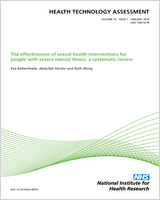Included under terms of UK Non-commercial Government License.
NCBI Bookshelf. A service of the National Library of Medicine, National Institutes of Health.
Carr SM, Lhussier M, Forster N, et al. An Evidence Synthesis of Qualitative and Quantitative Research on Component Intervention Techniques, Effectiveness, Cost-Effectiveness, Equity and Acceptability of Different Versions of Health-Related Lifestyle Advisor Role in Improving Health. Southampton (UK): NIHR Journals Library; 2011 Feb. (Health Technology Assessment, No. 15.9.)

An Evidence Synthesis of Qualitative and Quantitative Research on Component Intervention Techniques, Effectiveness, Cost-Effectiveness, Equity and Acceptability of Different Versions of Health-Related Lifestyle Advisor Role in Improving Health.
Show detailsThe Health Technology Assessment (HTA) programme, part of the National Institute for Health Research (NIHR), was set up in 1993. It produces high-quality research information on the effectiveness, costs and broader impact of health technologies for those who use, manage and provide care in the NHS. ‘Health technologies’ are broadly defined as all interventions used to promote health, prevent and treat disease, and improve rehabilitation and long-term care.
The research findings from the HTA programme directly influence decision-making bodies such as the National Institute for Health and Clinical Excellence (NICE) and the National Screening Committee (NSC). HTA findings also help to improve the quality of clinical practice in the NHS indirectly in that they form a key component of the ‘National Knowledge Service’.
The HTA programme is needs led in that it fills gaps in the evidence needed by the NHS. There are three routes to the start of projects.
First is the commissioned route. Suggestions for research are actively sought from people working in the NHS, from the public and consumer groups and from professional bodies such as royal colleges and NHS trusts. These suggestions are carefully prioritised by panels of independent experts (including NHS service users). The HTA programme then commissions the research by competitive tender.
Second, the HTA programme provides grants for clinical trials for researchers who identify research questions. These are assessed for importance to patients and the NHS, and scientific rigour.
Third, through its Technology Assessment Report (TAR) call-off contract, the HTA programme commissions bespoke reports, principally for NICE, but also for other policy-makers. TARs bring together evidence on the value of specific technologies.
Some HTA research projects, including TARs, may take only months, others need several years. They can cost from as little as £40,000 to over £1 million, and may involve synthesising existing evidence, undertaking a trial, or other research collecting new data to answer a research problem.
The final reports from HTA projects are peer reviewed by a number of independent expert referees before publication in the widely read journal series Health Technology Assessment.
Criteria for inclusion in the HTA journal series
Reports are published in the HTA journal series if (1) they have resulted from work for the HTA programme, and (2) they are of a sufficiently high scientific quality as assessed by the referees and editors.
Reviews in Health Technology Assessment are termed ‘systematic’ when the account of the search, appraisal and synthesis methods (to minimise biases and random errors) would, in theory, permit the replication of the review by others.
- NIHR Health Technology Assessment programme - An Evidence Synthesis of Qualitati...NIHR Health Technology Assessment programme - An Evidence Synthesis of Qualitative and Quantitative Research on Component Intervention Techniques, Effectiveness, Cost-Effectiveness, Equity and Acceptability of Different Versions of Health-Related Lifestyle Advisor Role in Improving Health
- Intervention intensity rating - An Evidence Synthesis of Qualitative and Quantit...Intervention intensity rating - An Evidence Synthesis of Qualitative and Quantitative Research on Component Intervention Techniques, Effectiveness, Cost-Effectiveness, Equity and Acceptability of Different Versions of Health-Related Lifestyle Advisor Role in Improving Health
- Random-effects network meta-analysis results - Selective internal radiation ther...Random-effects network meta-analysis results - Selective internal radiation therapies for unresectable early-, intermediate- or advanced-stage hepatocellular carcinoma: systematic review, network meta-analysis and economic evaluation
- Clinical case report form - The Role of Ultrasound Compared to Biopsy of Tempora...Clinical case report form - The Role of Ultrasound Compared to Biopsy of Temporal Arteries in the Diagnosis and Treatment of Giant Cell Arteritis (TABUL): a diagnostic accuracy and cost-effectiveness study
- Search strategies - Interventions to Reduce or Prevent Obesity in Pregnant Women...Search strategies - Interventions to Reduce or Prevent Obesity in Pregnant Women: A Systematic Review
Your browsing activity is empty.
Activity recording is turned off.
See more...